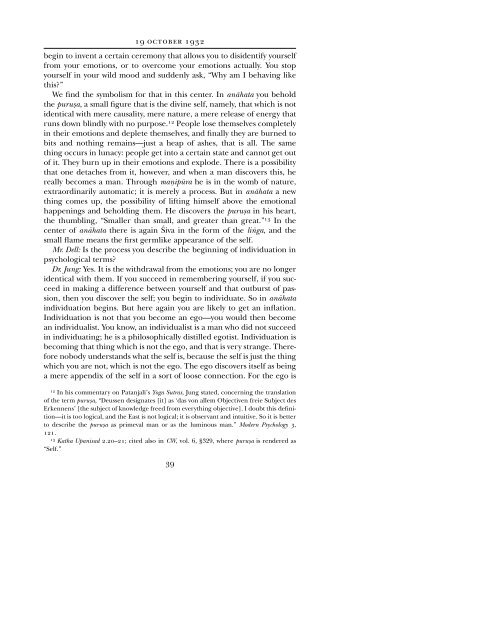CG JUNG - Countryside Anarchist
CG JUNG - Countryside Anarchist
CG JUNG - Countryside Anarchist
You also want an ePaper? Increase the reach of your titles
YUMPU automatically turns print PDFs into web optimized ePapers that Google loves.
19 OCTOBER 1932<br />
begin to invent a certain ceremony that allows you to disidentify yourself<br />
from your emotions, or to overcome your emotions actually. You stop<br />
yourself in your wild mood and suddenly ask, “Why am I behaving like<br />
this?”<br />
We find the symbolism for that in this center. In anvhata you behold<br />
the puruüa, a small figure that is the divine self, namely, that which is not<br />
identical with mere causality, mere nature, a mere release of energy that<br />
runs down blindly with no purpose. 12 People lose themselves completely<br />
in their emotions and deplete themselves, and finally they are burned to<br />
bits and nothing remains—just a heap of ashes, that is all. The same<br />
thing occurs in lunacy: people get into a certain state and cannot get out<br />
of it. They burn up in their emotions and explode. There is a possibility<br />
that one detaches from it, however, and when a man discovers this, he<br />
really becomes a man. Through maõipÖra he is in the womb of nature,<br />
extraordinarily automatic; it is merely a process. But in anvhata anew<br />
thing comes up, the possibility of lifting himself above the emotional<br />
happenings and beholding them. He discovers the puruüa in his heart,<br />
the thumbling, “Smaller than small, and greater than great.” 13 In the<br />
center of anvhata there is again åiva in the form of the li´ga, andthe<br />
small flame means the first germlike appearance of the self.<br />
Mr. Dell: Is the process you describe the beginning of individuation in<br />
psychological terms?<br />
Dr. Jung: Yes. It is the withdrawal from the emotions; you are no longer<br />
identical with them. If you succeed in remembering yourself, if you succeed<br />
in making a difference between yourself and that outburst of passion,<br />
then you discover the self; you begin to individuate. So in anvhata<br />
individuation begins. But here again you are likely to get an inflation.<br />
Individuation is not that you become an ego—you would then become<br />
an individualist. You know, an individualist is a man who did not succeed<br />
in individuating; he is a philosophically distilled egotist. Individuation is<br />
becoming that thing which is not the ego, and that is very strange. Therefore<br />
nobody understands what the self is, because the self is just the thing<br />
which you are not, which is not the ego. The ego discovers itself as being<br />
a mere appendix of the self in a sort of loose connection. For the ego is<br />
12 In his commentary on Patanjali’s Yoga Sutras, Jung stated, concerning the translation<br />
of the term puruüa, “Deussen designates [it] as ‘das von allem Objectiven freie Subject des<br />
Erkennens’ [the subject of knowledge freed from everything objective]. I doubt this definition—it<br />
is too logical, and the East is not logical; it is observant and intuitive. So it is better<br />
to describe the puruüa as primeval man or as the luminous man.” Modern Psychology 3,<br />
121.<br />
13 Katha Upanisad 2.20–21; cited also in CW, vol. 6, §329, where puruüa is rendered as<br />
“Self.”<br />
39


